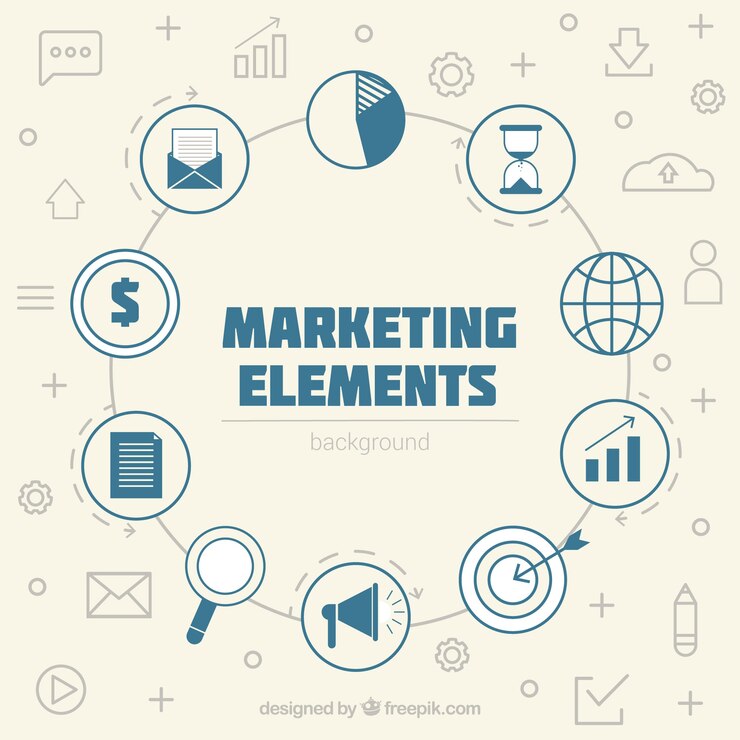Digital Marketing Icon

Professionals constantly look for the latest strategies to set their brands apart in the fast-paced digital arena. The landscape of digital marketing is like a canvas of innovation, and to truly be an icon in this domain, one must be both visionary and pragmatic. This blog post is your compass, guiding you through the intricate paths of digital marketing and highlighting the strategies and trends currently shaping the industry.
Harnessing the Power of Personalization Digital Marketing Icon
Personalization has shifted from a nice-to-have feature to a core expectation of consumers. From tailored emails to product recommendations, customers crave a digital experience that feels uniquely crafted for them. Data analytics and AI are now essential tools enabling brands to deliver hyper-personalized content and experiences.
Content personalization extends beyond addressing customers by their first name. It involves understanding their preferences, browsing behavior, and lifecycle stage to serve content that resonates personally. However, personalization also includes context — a timely and relevant message that meets consumers wherever they are in their digital journey.
Implementing Personalization Strategies
Segmentation Excellence: Begin by segmenting your audience effectively. The more granular your segments, the more personalized your content can become.
Dynamic Content: Leverage technology to create content that changes based on the user viewing it.
Lifecycle Marketing: Develop campaigns that cater to customers at different stages of their lifecycle with your brand.
Behavior Triggers: Use tools to identify and trigger actions based on user behavior in real-time.
Navigating the New Normal with Omnichannel Marketing
With the lines between online and offline experiences blurring, omnichannel marketing has become an imperative. Consumers expect a consistent brand experience across all touchpoints, be it through social media, mobile apps, or physical stores. A seamless omnichannel strategy can significantly enhance customer loyalty and satisfaction.
Read Moore: Digital Marketing For Roofers
To achieve this, businesses must break the silos between different marketing channels and ensure that customer data is shared and utilized effectively. Additionally, they must be agile, adjusting their strategies and messages to the channel without losing the brand’s core identity.
Mastering Omnichannel Marketing
Consistent Branding: Ensure a cohesive branding message and experience across all platforms and materials.
Integrated Customer Data: Invest in platforms that integrate and analyze customer data from different channels.
Adaptable Strategies: Be ready to adjust your marketing strategies to fit the requirements and demographics of each channel.
Unified Retail Experience: Integrate online and offline retail experiences to provide a seamless shopping experience for customers.
The Evolution of Content Marketing
Content marketing is experiencing a significant metamorphosis. Long-form content is outpacing short-form content, and video content is booming. Quality, relevance, and engagement are the new buzzwords. The role of content marketing has shifted from purely educational or entertaining to a key driver of customer journeys and brand stories.
In this evolution, understanding your audience and providing them with content that educates, inspires, or entertains is more important than ever. Brands are becoming publishers in their own right to showcase their products and establish themselves as authorities or entertainers within their niche.
Staying Ahead in Content Marketing
Video Domination: Invest in video content. Quality over quantity is key, but consistency is equally important.
SEO and Content Analytics: Integrate SEO strategy into your content creation and use analytics to fine-tune your approach.
Storytelling with a Purpose: Every piece of content should have a clear purpose and contribute to the brand’s overall story.
Content Cadence: Determine and stick to your audience’s right content cadence.
Leveraging Social Media in the Marketing Mix
Social media continues to be a powerhouse in the digital marketing mix. It’s a platform for advertisement and brand building, customer engagement, and community development. The rise of social commerce means that brands can now convert customers without them ever leaving the platform.
To leverage social media effectively, brands must be authentic, engaging, and community-focused. Influencer partnerships and user-generated content are also becoming more prevalent, bringing authenticity and relatability to the brand’s digital presence.
Social Media Strategies that Work
Consistent Engagement: Create a two-way dialogue with your audience. Respond to comments, run polls, and utilize stories to keep the conversation flowing.
Influencer Collaborations: Work with influencers whose audience aligns with your target demographic. Ensure that the collaborations feel natural and authentic.
UGC Campaigns: Encourage and reward users for creating content about your brand. User-generated content can be a powerful social proof tool.
Understanding Platform Nuances: Each social media platform has its strengths and audience. Tailor your content and approach accordingly.
The Mobile-First Mindset in Digital Marketing
The mobile-first approach is no longer a novelty; it’s a necessity. With mobile traffic surpassing desktops, brands must ensure their digital experiences are optimized for mobile devices. This includes not only mobile-friendly websites but also mobile-first content and advertising strategies.
In a mobile-first ecosystem, speed is critical. Users expect fast loading times and quick access to the information they need. Additionally, the rise of mobile apps requires brands to consider app store optimization (ASO) as their mobile SEO strategy.
Mastering the Mobile-First Approach
Responsive Design: Ensure that your website and content look and work well on all devices, particularly on mobile.
App Optimization: If you have a mobile app, invest in ASO to improve its visibility and downloads.
Location Targeting: Use the location data from mobile devices to personalize and target your content and advertising.
Mobile-First Campaigns: Design marketing campaigns with mobile in mind from the outset.
Innovations in SEO and Search Marketing
Search engines are evolving, and with them, so is search marketing. Voice search, structured data, and artificial intelligence are reshaping how we think about search engine optimization (SEO). Traditional keyword research and on-page optimization are still important, but they’re just pieces of the larger, more sophisticated SEO puzzle.
To stay ahead in search marketing, professionals must be attuned to these changes and be ready to adapt their strategies. This includes optimizing for featured snippets, keeping up with Google’s updates, and paying attention to mobile and local search trends.
Modernizing Your SEO Strategy
Voice Search Optimization: Understand how people talk, not just what they type. Use natural language in your content.
Structured Data Markup: Implement schema markup to help search engines understand your content better.
Local SEO: If your business has a local presence, prioritize local search optimization to connect with nearby customers.
Content Depth and Quality: Create thorough, high-quality content that provides real value to your audience. This is what the search engines are increasingly prioritizing.
Data-Driven Decision-Making in Digital Marketing
Data is the new gold in the digital marketing landscape. By analyzing data, marketers can make more informed decisions, personalize experiences, and measure the effectiveness of their strategies. Tools like Google Analytics, CRM systems, and A/B testing platforms empower marketers to be more precise and efficient.
However, data can be overwhelming. Marketers must focus on the metrics that matter most to their goals and be transparent about how they use and protect customer data.
Crafting a Data-First Marketing Approach
Defining Objectives and KPIs: Align your data analysis with clear business objectives and key performance indicators (KPIs).
Investing in Analytics Tools: Experiment with different analytics tools to find what works best for your team and data needs.
Customer Data Platforms (CDPs): Consider investing in a customer data platform to centralize and activate your customer data across all channels.
Data Privacy and Ethics: Stay up-to-date on data privacy regulations and best practices to protect your customers’ data and your brand’s reputation.
The Role of Artificial Intelligence and Automation
Artificial intelligence and automation are no longer future concepts but essential components of modern digital marketing. AI can help with personalization, content creation, predictive analytics, and more, significantly reducing the manual workload on marketing professionals.
However, the rapid advancements in AI also bring challenges, including the need for accurate and reliable data and the ethical use of AI in marketing. Marketers must consider the implications of using AI and ensure that it enhances the customer experience.
Integrating AI and Automation into Your Marketing

AI-Driven Personalization: Use AI to analyze and personalize content at scale.
Predictive Analytics: Leverage predictive models to anticipate customer behavior and needs.
Chatbots and Customer Service: Implement AI-powered chatbots to enhance customer service and support.
Testing and Optimization: Automation will be used to A/B test and optimize campaigns more efficiently.
Read Moore: Digital Marketing For Accountants
Future-Proofing Your Digital Marketing Strategy
To be an icon in digital marketing, foresight is as important as execution. Staying ahead of the curve, anticipating trends, and being prepared to adapt is crucial. The digital world will continue to evolve, and the businesses that thrive will be the ones that are agile, customer-focused, and data-driven.
Building a Future-Proof Marketing Strategy
Continuous Learning: Stay abreast of industry news and seize professional development opportunities.
Agility and Flexibility: Structure your marketing team and campaigns to pivot quickly in response to new opportunities or challenges.
Customer-Centricity: Keep the customer at the heart of your strategies, always striving to provide value and a personalized experience.
Sustainability and Ethics: Consider the long-term impact of your marketing strategies on the environment and society.
In conclusion, to become a digital marketing icon, professionals must constantly learn, adapt, and innovate. Understanding and integrating these key strategies and trends can build a unique, lasting presence in digital marketing.